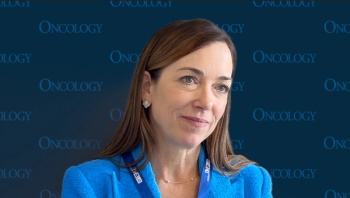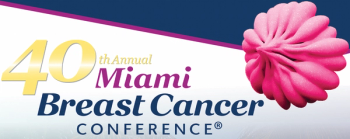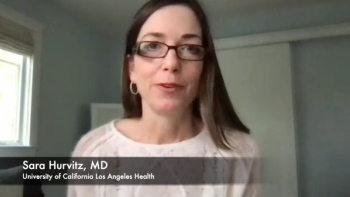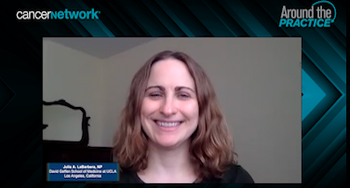Articles by Sara A. Hurvitz, MD

Presenting investigators at ESMO Congress 2025 highlight findings from clinical trials assessing novel therapeutics across different disease types.

Gedatolisib-based triplet regimens may be effective among patients with prior endocrine resistance or rapid progression following frontline therapy.

21 Distant Disease-Free Survival Across Key Subgroups From the Phase 3 NATALEE Trial of Ribociclib Plus a Nonsteroidal Aromatase Inhibitor in Patients With HR+/HER2− Early Breast Cancer
BySara A. Hurvitz, MD,Michal Jarzab,Montserrat Munoz Mateu,Erin Cobain,Jin Zhang,Arielle Medford,Alistair Ring,Priyanka Sharma, MD,Christian Schem, MD,Ionut Temciuc,Zheng Li,Juan Pablo Zarate,Denise A. Yardley, MD 
107 Neratinib-Based Combination Treatments for Patients With HER2-Positive Breast Cancer Brain Metastases
BySarah Sammons,Rachel A. Freedman,Adam M. Brufsky,Ahmad Awada,Sara A. Hurvitz, MD,Nancy U. Lin, MD,Cristina Saura,Sheri Leung,Bethann S Hromatka 
18 Vepdegestrant, a PROteolysis TArgeting Chimera (PROTAC) Estrogen Receptor (ER) Degrader, Plus Palbociclib in ER-Positive/Human Epidermal Growth Factor Receptor 2 (HER2)–Negative Advanced Breast Cancer: Phase 1b Cohort
ByErika P. Hamilton, MD,Rinath M. Jeselsohn,Sara A. Hurvitz, MD,Dejan Juric,Hyo S Han,Melinda L. Telli, MD,George Zahrah,Rita Nanda, MD,Yuanyuan Zhang,Weiwei Tan,Elizabeth Duperret,Eric Zhi,Cecile Mather,Anne F. Schott, MD 
21 Ribociclib (RIB) + Nonsteroidal Aromatase Inhibitor (NSAI) as Adjuvant Treatment in Patients (pts) With HR+/HER2– Early Breast Cancer (EBC): Final Invasive Disease-Free Survival (iDFS) Analysis From the NATALEE Trial
ByGabriel N. Hortobagyi, MD, FACP,Daniil Stroyakovskiy,Denise A. Yardley, MD,Chiun-Sheng Huang,Peter A. Fasching,John Crown,Aditya Bardia, MD, MPH, FASCO,Stephen Chia,Seock-Ah Im,Miguel Martin, MD, PhD,Sherene Loi, MD, PhD,Binghe Xu,Sara A. Hurvitz, MD,Carlos Barrios,Michael Untch, MD, PhD,Rebecca Moroose,Frances Visco,Federico Parnizari,Farhat Ghaznawi,Zheng Li,Sorcha Waters,Arunava Chakravartty,Dennis J. Slamon, MD, PhD 
22 Updated Results From VERITAC Evaluating Vepdegestrant, a PROteolysis TArgeting Chimera (PROTAC) Estrogen Receptor (ER) Degrader, in ER-Positive/Human Epidermal Growth Factor Receptor 2 (HER2)–Negative Advanced Breast Cancer
BySara A. Hurvitz, MD,Anne F. Schott, MD,Cynthia X. Ma, MD, PhD,Rita Nanda, MD,George Zahrah,Natasha Hunter, MD,Antoinette R. Tan,Melinda L. Telli, MD,Jesus Anampa Mesias,Rinath M. Jeselsohn,Pamela N. Munster, MD,Eric Zhi,Elizabeth Duperret,Cecile Mather,Erika P. Hamilton, MD,Hyo S Han 
29 ELEVATE: A Phase 1b/2, Open-Label, Umbrella Study Evaluating Elacestrant in Various Combinations in Patients (pts) With Estrogen Receptor–Positive (ER+), HER2-Negative (HER2–) Locally Advanced or Metastatic Breast Cancer (mBC)
ByHope S. Rugo, MD,Aditya Bardia, MD, MPH, FASCO,Erika P. Hamilton, MD,Sara A. Hurvitz, MD,Sara M. Tolaney, MD, MPH,Virginia Kaklamani, MD, DSc,Paula Muñoz Romero,Shannon Matheny,Kathy Puyana Theall,Joyce A. O’Shaughnessy 
36 MONARCH 3: Final Overall Survival Results of Abemaciclib Plus a Nonsteroidal Aromatase Inhibitor as First-Line Therapy for HR+/HER2– Advanced Breast Cancer
ByMatthew P. Goetz, MD,Masakazu Toi,Jens Huober, MD,Joohyuk Sohn,Oliver Trédan,In Hae Park,Mario Campone,Shin-Cheh Chen,Luis Manuel Manso,Shani Paluch-Shimon,Orit C. Freedman,Joyce A. O’Shaughnessy,Xavier Pivot,Sara M. Tolaney, MD, MPH,Sara A. Hurvitz, MD,Antonio Llombart,Valérie André,Abhijoy Saha,Gertjan van Hal,Ashwin Shahir,Hiroji Iwata,Stephen R.D. Johnston 
High-grade adverse effects with zanidatamab plus palbociclib and fulvestrant seem to be uncommon in patients with HER2-positive, hormone receptor–positive, metastatic breast cancer, according to Sara Hurvitz, MD, FACP.

Adding trastuzumab emtansine to tucatinib appears to significantly improve progression-free survival in patients with metastatic HER2-positive breast cancer, says Sara Hurvitz, MD, FACP.

20 TIP ELONA: An Open-Label, Phase 1b-2 Study of Elacestrant, in Combination With Onapristone in Patients With Estrogen Receptor– Positive, Progesterone Receptor– Positive, HER2-Negative Advanced or Metastatic Breast Cancer
ByErika P. Hamilton, MD,Lajos Pusztai, MD, DPhil,Hatem Soliman, MD,Sara A. Hurvitz, MD,Krzysztof J. Grzegorzewski,Nassir Habboubi,Priya Marreddy,Tarek Sahmoud, MD,Nuhad Ibrahim, MD 
24 ARV-471, a PROTAC Estrogen Receptor (ER) Degrader in Advanced ER+/Human Epidermal Growth Factor Receptor 2 (HER2)– Breast Cancer: Phase 2 Expansion (VERITAC) of a Phase 1/2 Study
BySara A. Hurvitz, MD,Anne F. Schott, MD,Cynthia X. Ma, MD, PhD,Erika P. Hamilton, MD,Rita Nanda, MD,George Zahrah,Natasha Hunter, MD,Antoinette R. Tan,Melinda L. Telli, MD,Jesus Anampa Mesias,Rinath Jeselsohn,Pamela N. Munster, MD,Haolan Lu,Richard Gedrich,Cecile Mather,Janaki Parameswaran,Hyo S Han 
55 TIP ELEVATE: A Phase 1b/2, Open-Label, Umbrella Study Evaluating Elacestrant in Various Combinations in Women and Men With Metastatic Breast Cancer (mBC)
ByHope S. Rugo, MD,Aditya Bardia, MD, MPH, FASCO,Javier Cortes,Giuseppe Curigliano,Erika P. Hamilton, MD,Sara A. Hurvitz, MD,Sibylle Loibl,Simona Scartoni,Tarek Sahmoud, MD,Krzysztof J. Grzegorzewski,Nassir Habboubi,Joyce A. O’Shaughnessy 
Sara Hurvitz, MD, spoke about ongoing clinical trials in which trastuzumab deruxtecan is being investigated with the use of brain metastases.

Sara Hurvitz, MD, spoke which patients would benefit most from fam-trastuzumab deruxtecan and what the next research steps will be.

Sara Hurvitz, MD, spoke to the difficulty of treating HER2-positive and advanced HER2-positive breast cancer and how the efficacy of novel agents such as fam-trastuzumab deruxtecan-nxki could make a difference in treating the disease.

Sara Hurvitz, MD, spoke about to recent approval of fam-trastuzumab deruxtecan-nxki in the second-line setting for patients with HER2-positive breast cancer.

A neuro-oncologist explains the prevalence of leptomeningeal metastases in HER2+ breast cancer and her preferred method of treatment.

A multidisciplinary panel of health care professionals and a patient advocate comment on their excitement about novel therapies in the pipeline for HER2-positive metastatic breast cancer.

Improvements regarding the identification and management of radiation necrosis in patients with HER2-positive metastatic breast cancer.

The importance of forming partnerships with patients and understanding their preferences for therapy when establishing treatment algorithms for patients with HER2-positive metastatic breast cancer.

Sara A. Hurvitz, MD, and Julia A. LaBarbera, NP, of UCLA, highlight the safety and efficacy profiles of newer novel treatment options available for HER2-positive breast cancer and brain metastases.

Variables that impact decisions to treat HER2-positive breast cancer and brain metastases with radiation therapy and systemic therapy, and recommendations on using memantine following radiation therapy.

Treatment recommendations for patients with HER2-positive metastatic breast cancer, like Erika Rich, upon identification of lesions in the brain.

Adverse events commonly associated with chemotherapies used to treat HER2-positive metastatic breast cancer, and recommendations to help equip patients with knowledge about what to expect during their treatment journey.

Erika Rich, a patient with HER2-positive metastatic breast cancer, explains why she opted to pursue a second opinion about her diagnosis and treatment options and proactively research her disease.

Recommendations for deciding what information is most important to discuss with patients during initial treatment planning for HER2-positive metastatic breast cancer.

Julia A. LaBarbera, NP, reacts to the treatment approach used for a patient with HER2-positive metastatic breast cancer, and highlights the benefits of new subcutaneous injections of trastuzumab and pertuzumab that are available.

Radiation oncologist Kamran Ahmed, MD, comments on indications for using radiation therapy to treat patients with HER2-positive de novo metastatic breast cancer.





































